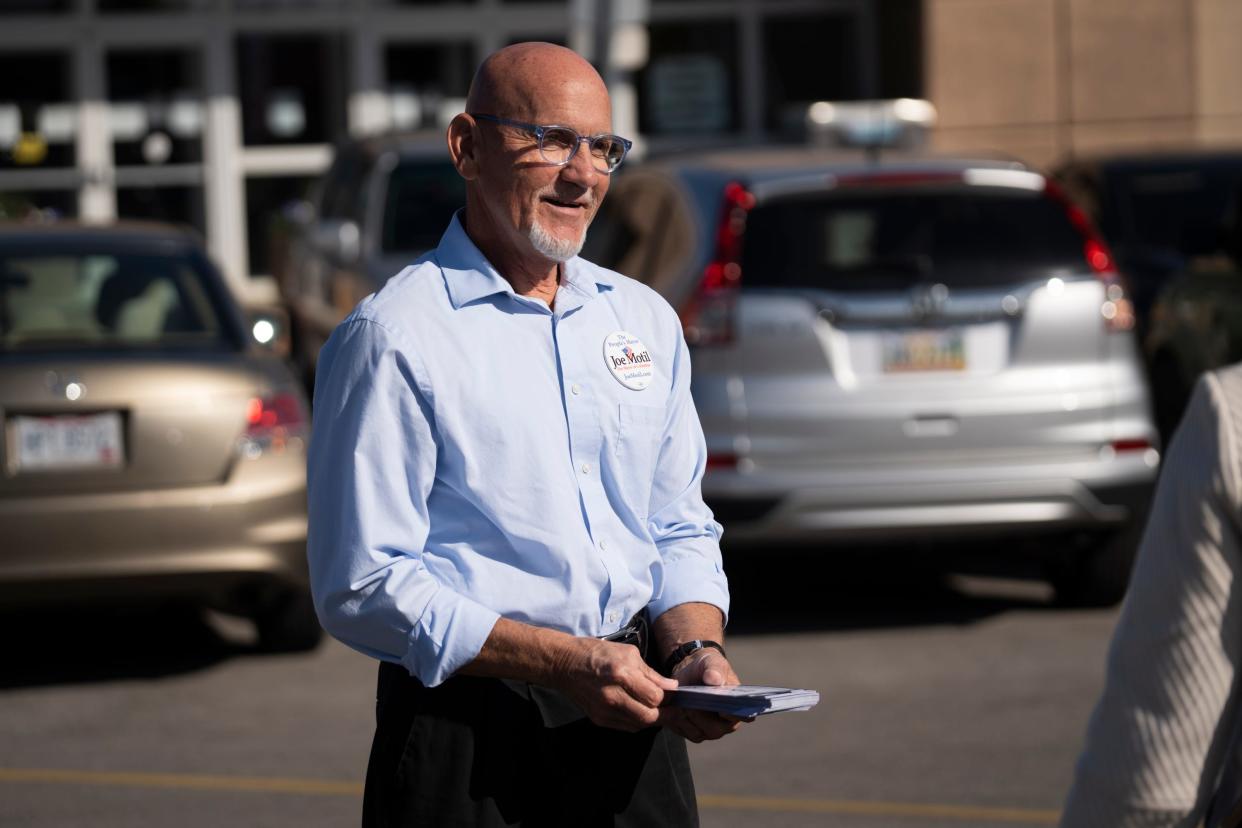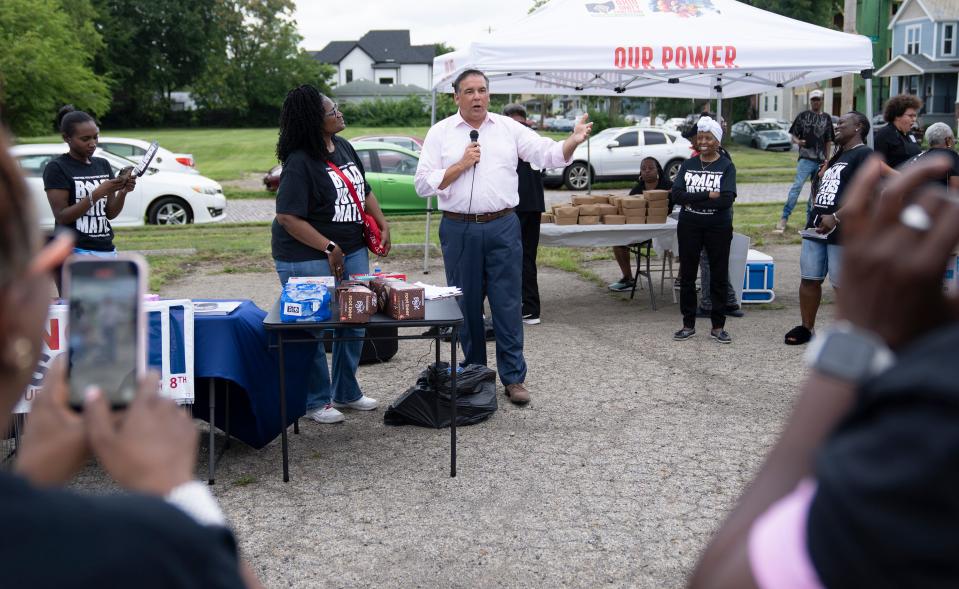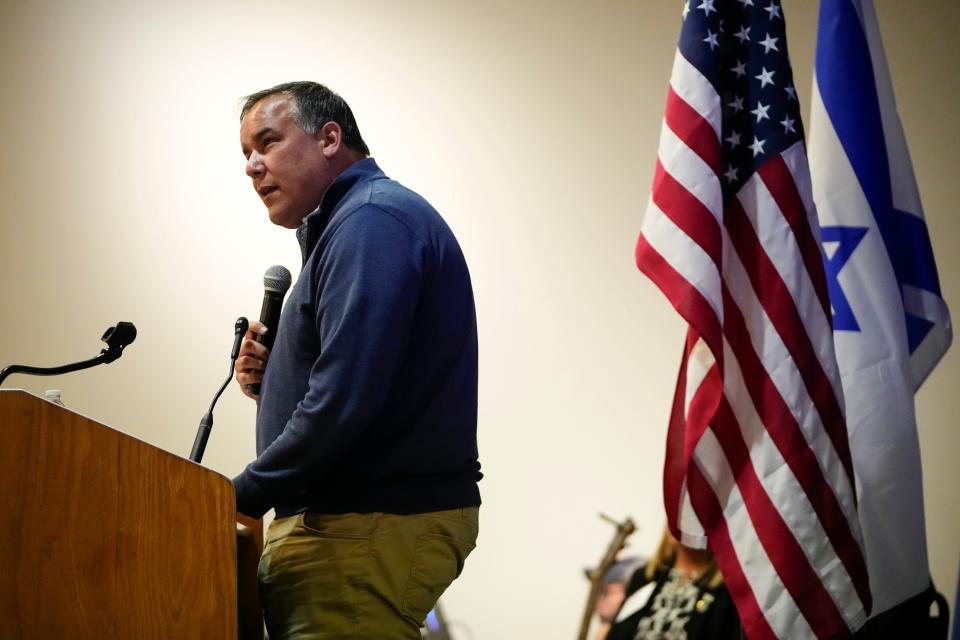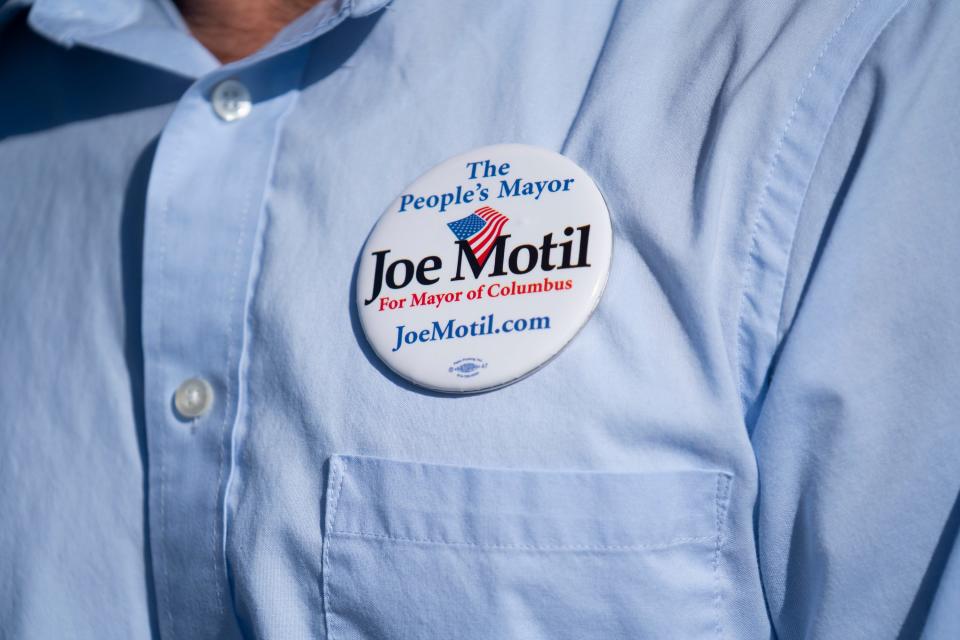Experience vs. outsider: Columbus mayoral candidates share their plans

Andrew J. Ginther and Joe Motil are both longtime Democrat politicians who grew up in the Clintonville area.
And that's about where the similarities between the two Nov. 7 ballot candidates for Columbus mayor end.
Ginther, 48, is a Democratic party insider and a successful politician for 22 uninterrupted years who is now seeking his third four-year term as mayor. He is an experienced administrator who has run a $2-billion-a-year city enterprise and steered the city through the sudden COVID 19 crisis, albeit with the help of hundreds of millions of dollars in federal emergency aid.
Ginther himself has a hefty campaign war chest that as of September reported total available funds of more than $1.2 million, including newly disclosed donations of $218,346 — often from businesses working for the city or developers involved in projects. He lives on the Northwest Side, near Clintonville.
Motil, 67, is a party outsider who has never held an office above area commissioner. He had a balance of less than $12,000 in his campaign, according to his last disclosure, which included new donations of $3,390. He has run unsuccessfully for various state and city posts dating back to 1998. Four years ago, when Ginther ran without an opponent to run Ohio's largest city, Motil waged an unsuccessful anti-establishment race for Columbus City Council, coming in a distant sixth, two slots behind the four victorious Franklin County Democratic Party-endorsed incumbents.

As a construction safety manager, Motil said he administered the working conditions of hundreds of employees on major building sites. Now retired, the Clintonville resident said he would look out for the well-being of residents of Columbus. He has been among Ginther's most vocal longtime critics.
Ginther is a soft-spoken, reserved public speaker who usually sticks to measured talking points, promoting partnerships that have shown tangible results in the city. Motil rarely takes prisoners in his public addresses, referring to "puppet" city leaders who are muting the political power of residents in favor of big-money donors.
The two offer a sharp contrast:
Ginther often praises "The Columbus Way" and the city's use of public-private partnerships with the leaders of the city's most powerful and influential companies to promote city initiatives. Motil also often drops the term "The Columbus Way," but does so mockingly, saying there is a second meaning where city leaders are captive to the whims of influential campaign benefactors in deals struck behind closed doors.
Ginther has made a cornerstone of his eight years as mayor of supporting property tax abatements for new development, calling it a jobs driver that pumps up the local economy and has contributed to the city's explosive state-leading growth. Motil's yard signs read: "Stop Tax Abatements," labeling them mostly as giveaways to connected campaign donors that shift the tax burden onto everyday working people.
Ginther has a taxpayer-financed public relations machine, with city spokespeople who most often speak on his behalf in written statements, and his campaign also has a spokesman. He is driven to public events with a police security detail. Motil, who can often be seen riding a bicycle around Clintonville for exercise, is usually a phone call away, running an almost one-man campaign. Far from having police security, he was arrested by Columbus police for protesting for the homeless on the front lawn of City Council President Shannon Hardin's house.
Ginther is running on his accomplishments, though getting control of gun violence that has tarnished the city's image with some central Ohio residents has remained elusive despite extensive efforts. Motil's hope is to put together a coalition of "anybody but Ginther" voters, people he says often feel steamrolled or ignored by city government.

Working his way up the ladder
Ginther was just 24 in 1999, working as a legislative aide to a Democrat state senator from Cleveland, when he first ran for the Columbus City Schools Board of Education. He told The Dispatch he spent hours on "phone time," calling a list of established professionals to seek money and advice.
"I'm learning there's no way there are enough hours in the day to do everything," Ginther said then.
Having studied conflict resolution in college, Ginther said he offered solutions to the discord on the highly charged school board, where firebrand member Bill Moss once shut down a meeting by taking out a shoe he had brought there in a briefcase and pounding it on the table.
"There are three kinds of people in this world — people who can identify problems, folks who can talk about problems, and folks who can solve problems — and we've already got two of the three on the (school) board," Ginther said at the time.
But the Columbus Whetstone High School graduate lost to three incumbents and a well-financed newcomer backed by the Downtown business establishment named Stephanie Hightower.
Ginther's first big political break came when a school board vacancy arose in 2001. Moss and four other Democrats scuttled an attempt to appoint a Republican, and threw out Ginther's name instead. He was just 26, and suddenly representing Ohio's largest school district without having ever won an election.
He became a favorite of former Dispatch Publisher John F. Wolfe, whose editorial pages endorsed Ginther for his first successful election in November 2001, saying he had "shown great promise with his intelligence, candor and articulate approach." Wolfe, a mostly uniform supporter of the GOP and longtime foe of Moss, would hold fundraisers for Ginther, even after a corruption scandal involving a political associate who is currently in federal prison.
Ginther won his first school board election in 2001 as an incumbent, and within three years he was vying for another appointment — this time onto the Columbus City Council. Despite being on the short list of six finalists, he lost out to Mary Jo Hudson, the council's first openly gay member, in September 2004.
But Ginther stuck with it, winning reelection to the school board in 2005 before again seeking and getting an appointment to City Council in 2006. He had landed his second big political break, and it again didn't involve any voters.
Ginther then won elections in 2007 and 2009 as an incumbent, and he was named council president in January 2011. He was first elected mayor — with the endorsement of former four-term mayor Michael B. Coleman, who had turned into a city lobbyist — in November 2015. At age 40, he had become one of the youngest big-city mayors in the country in what may have been his toughest election.
He was up against Franklin County Sheriff Zach Scott, another Democrat who had campaign money and had attacked Ginther's leadership on a school board audit committee during a time that a tipster was trying to alert officials to a major data-rigging scandal involving students' proficiency tests.
But Ginther crushed Scott 59% to 40% in a nasty, negative campaign. Six months later, Scott and two of his Democrat supporters, Franklin County Commissioner Paula Brooks and county Recorder Terry “TJ” Brown, were primaried and defeated, ending their bid to wrest control of local Democrat Central Committee from Ginther's wing, along with the coveted party endorsements.
Seeking four more years
Compared to the vicious campaign against Scott, Ginther has all but ignored the low-funded Motil in his current bid for reelection to mayor, including declining to participate in a debate. However, attacks on Motil have recently started surfacing in Ginther's TV ads, showing Motil has the attention of the Ginther campaign juggernaut.
"I've been mayor for eight years and I have been at a couple candidates forums," Ginther said at a recent get-out-the-vote rally when asked if he would debate Motil. "I talk to the press, as you know, very, very frequently. ...We'll continue to make ourselves available to the public and the press and lay out our plans for the future."
Ginther said Motil's proposal to end most property tax abatements would kill jobs and slow future city development. That would force layoffs of city police officers and firefighters, Ginther contends, because more than 80% of city tax revenue comes from income taxes.
"I think it's critically important that we require folks who are receiving incentives to honor their commitments, create the jobs that are supposed to be created, make the investment" that grows the economy, Ginther said. "But I think it is reckless and dangerous to, you know, potentially put thousands of jobs in jeopardy."
Neighborhood safety is currently Ginther's top priority, he said in response to a Dispatch candidate questionnaire. "That means ensuring police are on our streets to keep neighbors safe, slowing speed limits to reduce accidents and clearing refuse to keep streets clean." He and other city leaders have been locked in a political battle with the GOP-controlled Ohio General Assembly to use home rule power to enact local gun controls intended to improve gun safety and reduce violence.
"Enough is enough," he said of the state's "preemption" on any local gun ordinances, like requiring firearm lockboxes when storing guns around small children.
Ginther has presided over an intensive overhaul of the city's Police Division, hiring new Police Chief Elaine Bryant in June 2021 and later buying out older officers to replace them with newly trained ones. Both moves were in response to criticism of the police handling of racial justice protests in Columbus following the May 25, 2020, murder of George Floyd. Jr. by Minneapolis police Officer Derek Chauvin. Ginther helped usher in the creation of the city's first Civilian Police Review Board to investigate alleged officer misconduct, alongside the Division's Internal Affairs bureau, which still exists by union contract.
Before the last election four years ago, and in response to a Dispatch series identifying crime and poverty along Sullivant Avenue in parts of Franklinton and the Hilltop, Ginther declared assisting the area a priority. Asked for a progress report, Ginther's office listed a new police substation, $10 million in street and sidewalk repairs, a dedicated code enforcement officer to address violations, millions in human services funding, and other initiatives to addres problems there.
Ginther has made a priority of getting new housing constructed to combat an affordability crisis, pushing for the city to loosen its zoning code to streamline the way for denser, bigger and taller developments, while backing two voter-approved bond initiatives to subsidize construction of affordable housing: one for $50 million in 2019 and another for $200 million in 2022.
"Change is inevitable," Ginther said of the zoning code rewrite, to be debuted next spring. "We can meet it head-on, or bury our heads in the sand."
Ginther, along with business leaders, presided over the city's "Save the Crew" effort to keep the city's professional soccer team from leaving town, which involved a heavily subsidized new Downtown stadium that opened in June 2021. A "public benefit" portion of that plan, a major city recreation area on state land at the former Mapfre, never happened, despite being announced as almost a done deal.

Motil's long march
In November 1995, Motil — then a 39-year-old construction worker and Clintonville area commissioner — took on the endorsed Democrat for Columbus City Council, Lisa Griffin, who had been appointed to fill a vacancy.
"I'm a neighborhood person, just a middle-class Joe, so to speak," Motil, told The Dispatch during that race.
The Franklin County Democrats urged him to withdraw from the race, saying he would become a "spoiler" to help elect Republican Peggy Fisher in the head-to-head contest to fill the vacant seat. He declined, and attacked Griffin, who ran a marketing and communications business, for having public contracts while an elected official.
Fisher won, with Motil and Griffin splitting the Democrat votes. Three years later, Motil gained the Democratic endorsement to try to unseat Republican state Rep. E.J. Thomas, but he again lost. He immediately applied for a vacancy appointment to City Council — the same route that landed Ginther where he is today — but was passed over in favor of environmental lawyer Michael Mentel.
Motil then took on former Columbus City Schools Board of Education member Mark Hatch in the 2000 Democratic primary for a central Ohio state representative seat, and lost. Motil ran for City Council again in 2003 and 2019, and lost.
Despite his past defeats, Motil says he likes his chances in the current head-to-head matchup. Ginther has been involved in numerous issues where city decisions have upset neighborhood activists, Motil said, and believes votes from those spurned residents will add up.
"I've worked with neighborhoods clear across the city of Columbus," Motil said. He cited issues with the city's controversial redesign of the Little Turtle subdivision entrance on the Northeast Side, approval of a 262-unit apartment building on a former Giant Eagle store site near German Village, and most recently, problems including a shooting involving a relocated Greyhound bus station on the West Side that city leaders had seemed to do little to keep Downtown.
"I've reached out to people, and people reach out to me all the time, asking for my help, asking for my assistance," Motil said. "And that's what I've got going for me."
A historic preservationist, Motil said he has worked to support saving local historic buildings, including the Ohio State Penitentiary, the former Downtown stone prison that former Columbus Mayor Dana G. "Buck" Rinehart personally took a wrecking ball to in 1990.
Motil has been a staunch advocate for the homeless, even getting arrested on the front lawn of City Council President Shannon Hardin's house - where he had set up a tent - to protest the city's shuttering of a homeless camp. He said Hardin, who he knows from Motil's frequent addresses to City Council, came out and said: "Joe, what are you doing here?" To which he responded "What do you think I'm doing here?"
Police officers told him he could avoid the arrest if he simply left, but he chose instead to be booked.
"I have been fighting for fairness and opportunity, and directly with the people of this community, for 40 years," Motil said. "And I'm very outspoken and candid, and I think a lot of people respect that — that I'm not afraid to say what needs to be said."
Motil has been almost the only voice to publicly and consistently call for a major scaling back of city property-tax abatements on new development, which he said is hurting Columbus City schools.
"Tax abatements do not drive economic development, period," he said in a recent interview while campaigning outside the Franklin County Board of Elections on the first day of early voting. "Corporations don't locate somewhere because of tax abatements. That's absurd."
Ginther's emphasis on economic development is "putting profit and the bank accounts of the rich over people," Motil said in a questionnaire. He says he believes the city's biggest issue is "the intersecting, inseparable need to provide residents with their right to decent, truly affordable housing and to live safely without fear of crime and violence."
On zoning, Motil says he's open to changes to the code, but rejects the current argument from Ginther, Hardin and other council members that an upcoming population "tsunami" and past "redlining" mean "we should trust them on what is best for our neighborhoods on where and how much density should occur. Citizens voices are being silenced (under the proposed changes). Present proposals only benefit developers and large landlords."
Does the city have enough public pools? "No," Motil responded to The Dispatch questionnaire, contending Ginther has put developers' needs to pay less taxes ahead of residents' recreational needs.
"Columbus has one indoor pool," Motil said, but Ginther "funds $7.5 million for a Downtown splash park."
As for addressing gun violence, Motil responded to The Dispatch questionnaire that the answer is: "Prioritizing people and neighborhoods. Addressing poverty, public education, systemic racism, homelessness, decent affordable housing, workforce development."
wbush@gannett.com
@ReporterBush
This article originally appeared on The Columbus Dispatch: Mayor Andrew Ginther and Joe Motil are seeing to be Columbus mayor

